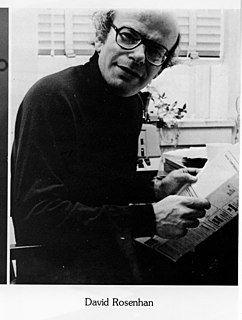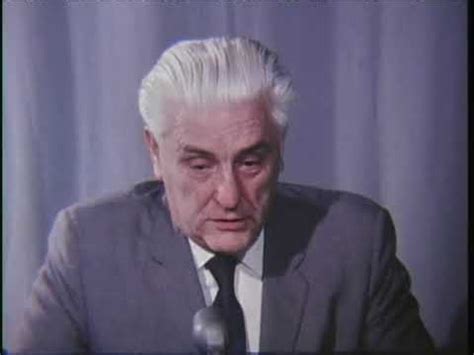A Quote by David Rosenhan
The facts of the matter are that we have known for a long time that diagnoses are often not useful or reliable, but we have nevertheless continued to use them. We now know that we cannot distinguish insanity from sanity.
Related Quotes
It surely can be no offence to state, that the progress of science has led to new views, and that the consequences that can be deduced from the knowledge of a hundred facts may be very different from those deducible from five. It is also possible that the facts first known may be the exceptions to a rule and not the rule itself, and generalisations from these first-known facts, though useful at the time, may be highly mischievous, and impede the progress of the science if retained when it has made some advance.
Sometimes a god comes.... He brings a new way to do a thing, or a new thing to be done. A new kind of singing, or a new kind of death. He brings this across the bridge between the dream-time and the world-time. When he has done this, it is done. You cannot take things that exist in the world and try to drive them back into the dream, to hold them inside the dream with walls and pretenses. That is insanity. What is, is. There is no use pretending, now, that we do not know how to kill one another.
It cannot be too strongly asserted that the insistence on blind, unreasoning faith is due mainly to the maintenance of a subject-matter upon which there was no knowledge, namely the 'other world'; and that this basis was assumed because of early man's preoccupation with death. It is, unfortunately, quite possible to believe a thing which is contradicted by facts, especially if the facts are not generally known; but if the whole position on which we rested our religions had been visibly opposed by what we did know, even the unthinking masses would, in time, have noticed it.
Facts are neutral until human beings add their own meaning to those facts. People make their decisions based on what the facts mean to them, not on the facts themselves. The meaning they add to facts depends on their current story … facts are not terribly useful to influencing others. People don’t need new facts—they need a new story.
Were I disposed to consider the comparative merit of each of them [facts or theories in medical practice], I should derive most of the evils of medicine from supposed facts, and ascribe all the remedies which have been uniformly and extensively useful, to such theories as are true. Facts are combined and rendered useful only by means of theories, and the more disposed men are to reason, the more minute and extensive they become in their observations
I don't like realism. We already know the real facts about li[fe], most of the basic facts. I'm not interested in repeating what we already know. We know about sex, about violence, about murder, about war. All these things, by the time we're 18, we're up to here. From there on we need interpreters. We need poets. We need philosophers. We need theologians, who take the same basic facts and work with them and help us make do with those facts. Facts alone are not enough. It's interpretation.
Knowing what you need doesn't always mean you know how to get it, though. I'd spent a long time hiding in my cave. No matter how much I might want to come out into the light, I knew it would hurt my eyes. I was a fool. A fool, but nevertheless too smart not to know I was the architect of my own demise, that it was time to put my past behind me. It was time to stop allowing the white elephants to stand unspoken of in my living room.





































